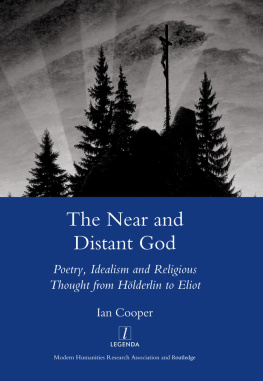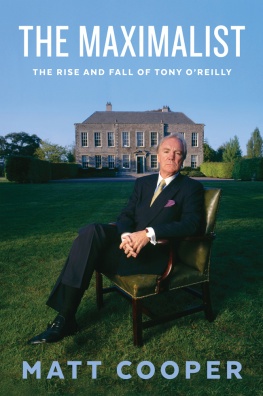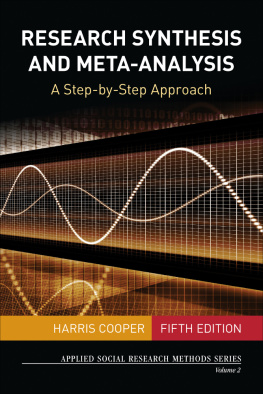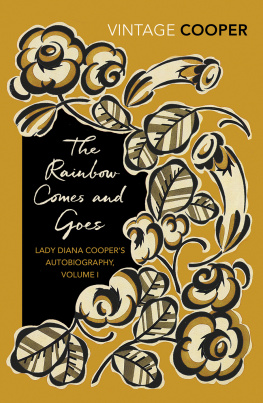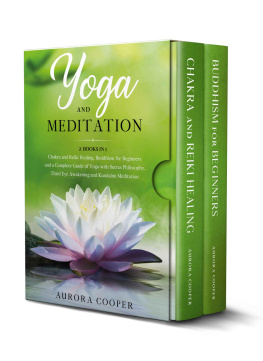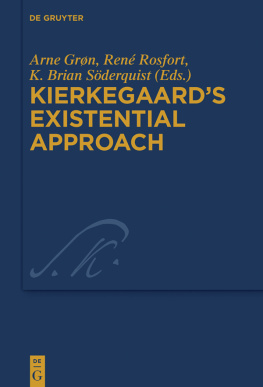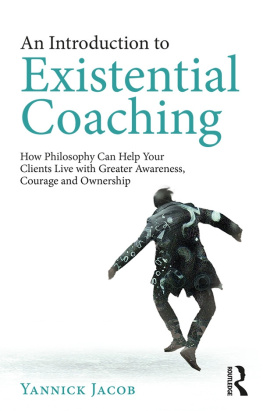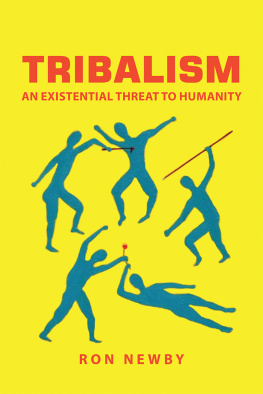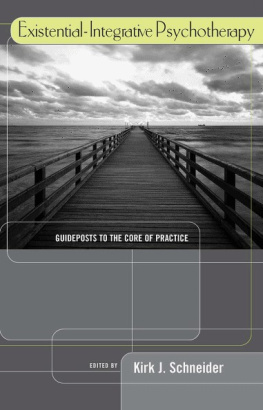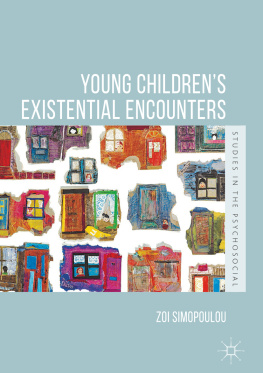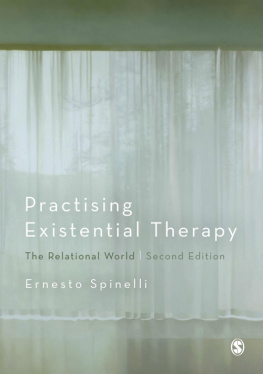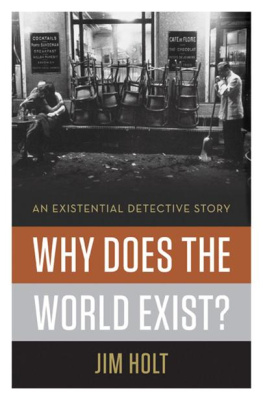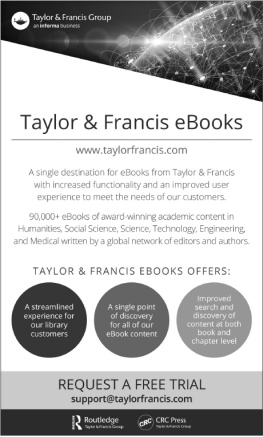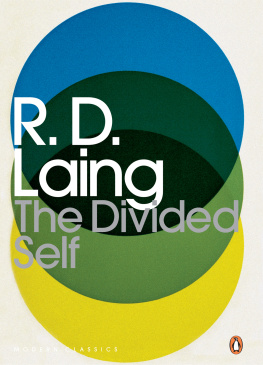Existential Therapies
Praise for the Book
Mick Cooper has done the counselling and psychotherapy community a great service by tracing the many influences that have shaped contemporary approaches to existential therapy. Cooper has woven together the various strands of thought into a coherent and lively presentation of how existential therapy is practised today. The book combines scholarship with a writing style that makes difficult concepts accessible. It should be required reading on any course where the existential tradition plays a part, and that includes person-centred courses and all sympathetic to the idea that psychotherapy is, in essence, a human encounter where warmth, understanding and a deep respect for the individual are key values.
Tony Merry
This is a book of superb thoroughness and scholarship an unprecedented guide to existential therapys chief positions and controversies.
Kirk J. Schneider, President of the Existential-Humanistic Institute
Though philosophers through the ages have practised existential counselling, it is only in the past hundred years that this approach has been formally developed and recognized as a form of psychotherapy. This publication marks a milestone in the long history of the existential therapies in providing an excellent, clear and critical overview of the contrasting forms of the approach as it is currently practised. Coopers special merit is to present the different flavours of existential therapy in an evocative and sometimes provocative fashion. He invites his readers to sample the whole range; he highlights potential bias, and then in true existential tradition leaves his readers to arrive at their own conclusions and work out their own versions of existential therapy.
Emmy van Deurzen
Existential Therapies
Mick Cooper

Mick Cooper 2003
First published 2003
Apart from any fair dealing for the purposes of research or private study, or criticism or review, as permitted under the Copyright, Designs and Patents Act, 1988, this publication may be reproduced, stored or transmitted in any form, or by any means, only with the prior permission in writing of the publishers, or in the case of reprographic reproduction, in accordance with the terms of licences issued by the Copyright Licensing Agency. Inquiries concerning reproduction outside those terms should be sent to the publishers.
 | SAGE Publications Ltd
6 Bonhill Street
London EC2A 4PU |
SAGE Publications Inc
2455 Teller Road
Thousand Oaks, California 91320 |
SAGE Publications India Pvt Ltd
B-42, Panchsheel Enclave
Post Box 4109
New Delhi 100 017 |
British Library Cataloguing in Publication data
A catalogue record for this book is available from the British Library
ISBN 0 7619 7320 6
ISBN 0 7619 7321 4 (pbk)
Library of Congress Control Number: 2002115863
Typeset by C&M Digitals (P) Ltd, Chennai, India
Printed in Great Britain by The Cromwell Press Ltd, Trowbridge, Wiltshire
Dedication
In loving memory of my father, Charles Cooper (19102001), a communist and humanist, who taught me to value freedom, to question conventional wisdoms, and to honour the tragic side of life an existentialist in spirit, if not in name.
Contents
Acknowledgements
From an existential perspective, a human being is inseparable from their social context, and the writing of this book would not have been possible without the emotional and intellectual support of numerous friends, colleagues, family members and teachers.
Thanks, first of all, go to my partner, Helen Cruthers. Helen gave me enormous encouragement, love and help during the writing of this book, and her comments and guidance on numerous drafts were invaluable. On the home front, I would also like to thank my two little daughters, Maya and Ruby. Lost in tomes of Heideggerian and Kierkegaardian thought, nothing could have lifted my spirits more than to have a young toddler bound into my study, smile mischievously, and then proceed to pile all my philosophical books, one-by-one, onto the floor! Special thanks also go to Jennifer Cruthers and Kitty Cooper, who grandmothered Maya and Ruby so lovingly and diligently, and helped me find the time to complete this book.
I am also greatly indebted to Emmy van Deurzen, who gave me extensive and detailed feedback throughout the writing of this book. Many thanks also go to the following colleagues and friends for their informative, encouraging and challenging feedback: Ivan Ellingham, Alec Grant, Mike Harding, Angie Hart, Helen Hopkins, Tim LeBon, Paul McGahey, Tony Merry, Jacquy Paizas, Geraldine Pass, Kirk Schneider, Ernesto Spinelli, Freddie Strasser, Dominic Velarde and Sarah Young. A number of therapists and academics also generously gave me their time to talk through various aspects of the existential therapies, and to them I am also grateful: Hans Cohn, Erik Craig, Miles Groth, John Heaton, Wilhelm Maas and Paul Wong.
The majority of this book was researched and written during a sabbatical semester, and for that I would like to thank colleagues in the School of Applied Social Science at the University of Brighton, who not only awarded me the sabbatical, but covered my teaching load. I am also very grateful to the learning resources team at the University of Brightons Falmer Library, who patiently processed for me numerous inter-library loan requests.
Finally, I would like to say a special thank you to Lucia Moja-Strasser, one of the great unsung heroes of existential therapy. Like many other UK-trained existential therapists, Lucia was a pivotal figure in my development as an existential therapist, and without her dedication, honesty and encouragement, I very much doubt I would have been in a position to write this book today.
Needless to say and particularly from an existential standpoint the contents of this book are my responsibility alone.
Mick Cooper
1. | Introduction: the Rich Tapestry of Existential Therapies |
What is existential therapy? As an existential therapist and trainer, this is one of the questions that I have been most frequently asked. It has also been one of the questions that I have found the most difficult to answer. Its um about facing the reality of existence I have sometimes muttered, or come out with a stock response like, Its similar to person-centred therapy only more miserable! Over the years, however, it has gradually dawned on me why this question has been so difficult to answer: because the term existential therapy has been used to refer to so many different therapeutic practices. Whilst Yaloms (1980) existential psychotherapy, for instance, encourages clients to face up to four ultimate concerns of existence death, freedom, isolation, meaninglessness van Deurzens (2002a) existential psychotherapy encourages clients to explore four dimensions of worldly being: the physical, personal, social and spiritual dimensions. Similarly, whilst Bugentals (1978) existential-humanistic approach encourages clients to focus in on their subjective experiences, Frankls (1984) existential analysis frequently encourages clients to focus out on their responsibilities towards others. As several other commentators have concluded, then, it is simply not possible to define the field of existential therapy in any single way (Moja-Strasser, 1996). Rather, it is best understood as a rich tapestry of intersecting therapeutic practices, all of which orientate themselves around a shared concern: human lived-existence. In other words, as Walsh and McElwain conclude, it is more appropriate to speak of existential psychotherapies rather than of a single existential psychotherapy (2002: 254); and this is the fundamental premise for the present book.
Next page

